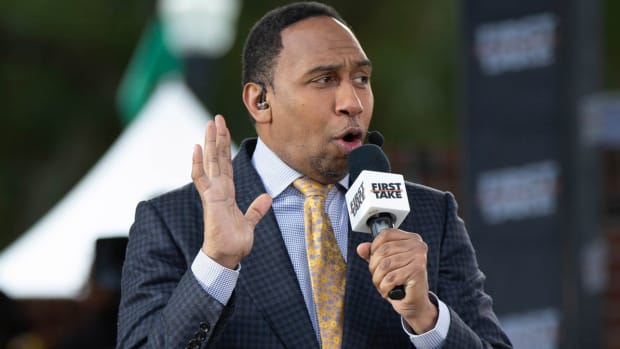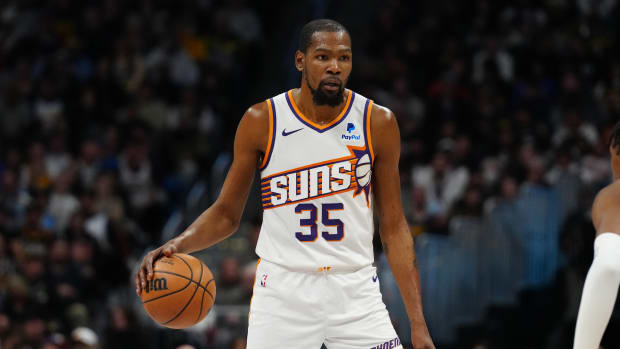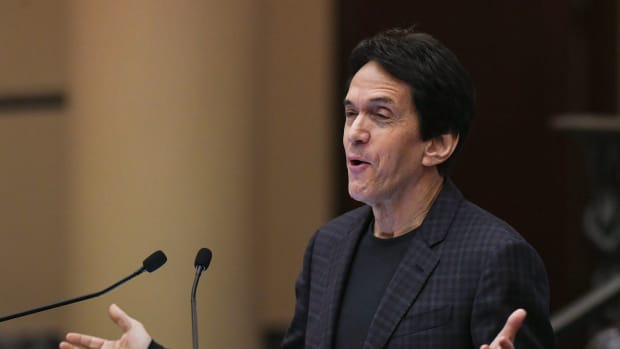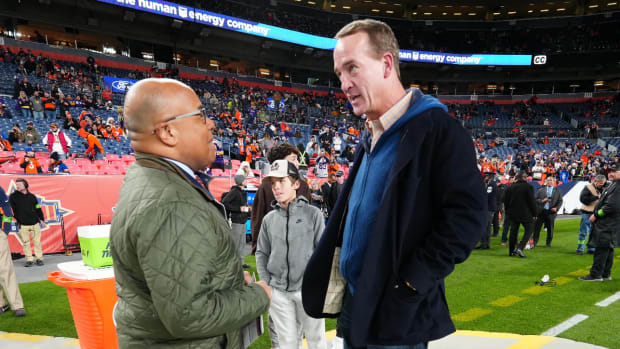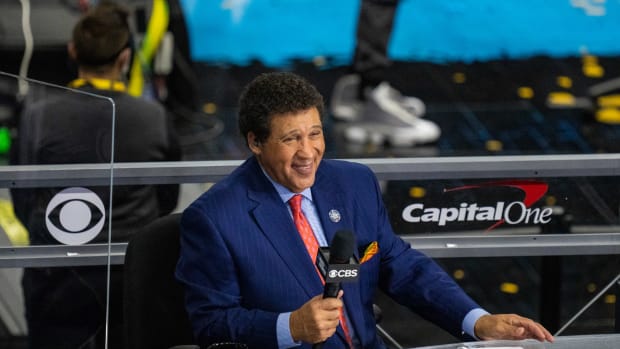Taking a look at President Obama’s potential as a sports commentator
No matter where you stand on politics, I think most Americans would agree President Barack Obama’s passion for sports is legit, particularly his love of basketball. Dan Pfeiffer, a former Senior Advisor to Obama for strategy and communications, recalled a story to SI this week that offered a glimpse into the life of a hoops junkie. “In 2007 I had just started working for the President and we were campaigning in Iowa during the 2007 Final Four,” Pfeiffer said. “While the President was doing a town hall, I was watching the Georgetown-Ohio State game on a TV in the coaches office of the high school where the event was. I went to Georgetown and am a huge fan of the basketball team. The Town Hall ended before the game, but instead of leaving as were supposed to, the President came back and watched the game with me until Georgetown’s fate (a 67-60 Ohio State win behind Mike Conley and Greg Oden) was sealed.”
As the Obama Presidency comes to a close, I started thinking about the interest sports networks would have if Obama offered a hint of interest as an on-air commentator. (Obama has suggested he will either work in teaching, or lead an organization designed to help young people get educations, jobs, and, in his own words, “to try to bring businesses into neighborhoods that don't have enough businesses.”) The President would be a unique sports broadcasting candidate—a proven communicator known globally with a definitive love of sports. He’s also only in his mid-50s. Based solely on name recognition and stature, Obama would pique interest early on. Also, as a general rule, television viewers love former Presidents (maybe not Richard Nixon, but there’s always an exception to the rule.)
• Should sports media members discuss politics publicly?
Last week I spoke to executives at ESPN, Fox, and NBC to see what they say, mostly out of curiosity. (CBS strangely declined the request; Turner Sports did not get back to SI by press time.)
“I would absolutely hire President Obama if he expressed an interest in working as a sports commentator,” said Jim Bell, the executive producer of NBC’s Olympic coverage and the former showrunner for The Today Show. “At times even he might admit that he can be more passionate about sports than politics, and one could imagine that only becoming more frequent after he leaves the White House. The president follows sports, understands sports, and has strong opinions about the world of sports. When championship teams visit the White House, he doesn’t need a briefing to know their storyline. Barack Obama speaks the language of sports.”
“Well known, great communicators packaged with great sports fandom don't grow on trees, so yes we would be interested in talking to him,” said Traug Keller, the ESPN senior vice president of productions and business divisions. “I had a similar conversation with Bill Clinton back when he had left office and I was running the ABC Radio Networks. President Clinton had expressed interest and we had just syndicated Sean Hannity to a great deal of success. In the end there was just too much to do for a former President and my sense it that will be the same with President Obama.”
• Media Mailbag: Al Michaels’s future, Olympics coverage and more
Said Charlie Dixon, the executive vice president of content and original programming for Fox Sports. “Would I hire the most recognizable face on the planet in an industry where we obsess about Q scores on a daily basis? Yes. Yes, I would.”
Bell said he could not see Obama appearing on a daily or weekly studio show—or covering games on a regular basis—but he could see him as a guest commentator for one-off events such as the Olympics, the NCAA tournament, or a major golf event.
“Beyond the “wow” factor of having a former President, I think he would offer genuine insight into the game,” Bell said. “We’ve seen how well he plays with others in non-political settings like Jimmy Fallon or Zach Galifianakis on Between Two Ferns. He listens, reacts, and can be very funny. And he is not afraid to express a strong opinion, which can make for great television.”
While Pfeiffer made it clear that he does not believe Obama would ever consider the path of working in sports television on a regular basis, he believed if he were to do so, Obama would want to be an in-studio analyst breaking down NBA games.
• Olympic media roundtable: Concerns and thought about 2016 Rio Games
“There is no question that it would be the NBA,” said Pfeiffer, who currently co-hosts an excellent political podcast for The Ringer titled “Keeping It 1600.” “He is a huge fan of his hometown Bulls, but he loves the game generally and will watch just about any NBA game if there is one and he has some time. He is deeply knowledgeable, loves to talk about the game and is deeply curious about things like how to set up our defense to stop Steph Curry, how the Cavs could better utilize Kevin Love or what offensive sets the Thunder could have used to free up Kevin Durant.”
Keller said he’d believes ESPN would have a great selling point—pairing him with his brother-in-law Craig Robinson on college games.
“President Obama represents all pick up hoop junkies across the country and having him sit in on some NBA or college games as a commentator would be fun although we would have to keep him away from Bulls’ games to take away his bias,” Keller said. “He is a tremendous sports fan and just from the times we have had him on in the past it's clear he has a vast knowledge base especially around basketball. He has the wit and he certainly is not afraid to be critical.”
One issue that interested me was how sports television executives would weigh hiring a politician versus the downside of alienating some viewers who might not support the politician’s politics. There are a large swath of people in the U.S.—obviously who are not fans of Obama and his policies.
“I don’t see much downside,” Bell said. “The minute they’re out of office, partisanship and rancor can often diminish. And the apolitical nature of sports usually washes over ideological differences. Have you ever seen a former President throw out the first pitch at a baseball game? They’re very warmly received; the crowd isn’t there to think about party affiliation or politics – it’s all about the game.”
• Should fans be included in future sports broadcasts?
“I think sports is the great equalizer when it comes to race, politics and gender,” Dixon said. “On daily sports shows, fans want to see passion, authenticity and insight. Politics is almost irrelevant.”
“It would certainly be a concern and we would have to be mindful of it,” Keller said. “But in the end I would be more worried about him alienating Knicks fans because of his love for the Bulls.”
Clearly, Obama isn’t heading into the sports media after his Presidency concludes. But it seems well worth it for a network to contact him to see if he’d ever be interested in a one-off, particularly for the NBA Finals, the NCAA Tournament, or as a picker for College GameDay or Inside The NBA guest panelist. It’d be interesting sports television for a couple of hours and a great ratings play for that network.
THE NOISE REPORT
SI.com examines the week’s most notable sports media stories:
1. You won. That’s the takeaway from last Thursday’s announcement that the College Football Playoff management committee (made up of the 10 FBS conference commissioners and Notre Dame athletic director Jack Swarbrick) will shift future college football semifinal games from New Year’s Eve in the years when the semis aren’t in the Rose and Sugar bowls. All future semifinal games will played on Saturdays or holidays. (Last year’s semis were played on New Year’s Eve, which fell on a Thursday.) SI’s Andy Staples had an excellent piece on the decision here.
Why did this happen? Simple. The ratings tanked, the negative publicity was voluminous, and ESPN execs applied behind-the-scenes to make a change. Alabama’s 38–0 win over Michigan State in the Cotton Bowl drew 18,552,000 viewers, down 45% in viewership versus 2015 while the Orange Bowl matchup featuring Clemson’s 37–17 victory over Oklahoma averaged 15,640,000 viewers, down 34.4% in viewers. Those are not small drops; that’s a television disaster. And that’s why things are changing.
Contractually, ESPN had zero power to make changes, even with the $5.6 billion they paid for the rights to the bowl games. CFP officials controlled the dates. But give ESPN executives credit here. Its executives never criticized the CFP decision-makers publicly, but rather cautiously said they hoped to discuss better dates for fans in the future. The hubris of CFP executive director Bill Hancock and his posse to force Americans to choose between traditional New Years Eve activities and the national semifinals was outrageous and that group deserved all the pillorying they received. They get no praise here for doing the right thing long after the fact, but I’m happy for college football fans.
• TV networks love Kevin Durant’s decision
1a. In an effort to keep viewers longer for the event, Bloomberg reported that NBC asked the IOC to change the language of the ceremony from Portuguese to English, which would have put the United States near the back of the parade of nations. The IOC declined, saying its rules require that the official language of the opening ceremony has to be that of the host country. In Portuguese, the United States delegation is listed as Estados Unidos.
1b. Two longtime sports columnists at the New York Times—Harvey Araton and William C. Rhoden—opted to accept a buyout from the newspaper. If you read this column, you’ve likely have heard of them. Both Araton and Rhoden were immensely respected in sports writing—thoughtful voices who offered readers reported opinion rather than blather and bloviating. They will be missed. On a personal note, I spent a number of years with Araton covering women’s Final Fours and always admired his work ethic and direct questions of subjects. He was very good company; a decent man. Both men, I hope, will continue in sports journalism in some form. The profession needs them.
1c. Here’s Rhoden’s final column for the Times.
2. Some thoughts on ESPN NFL analyst Tom Jackson telling the network that he was leaving after 29 years.
2a. SiriusXM NFL Radio has hired Brett Favre to work as a host. Favre will debut in August live from the Pro Football Hall of Fame and host shows regularly (with co-host Bruce Murray) during the season.
2b. The NFL Network’s new morning show—Good Morning Football—premieres Monday at 7:00 a.m. ET. The three-hour show will air from CBS Broadcast Center in New York City Monday-Friday and features hosts Kay Adams, Nate Burleson, Peter Schrager and Kyle Brandt.
3. Episode 68 of the Sports Illustrated Media podcast features Sports Business Daily media writer John Ourand, who makes his third (a record for a guest) appearance on the podcast
In this episode, Ourand and Deitsch discuss the viewership potential for the Rio Olympics, how NBC Sports will cover the negative stories coming out of Rio, whether the Olympics is a good investment for NBC, the upcoming ACC Network and whether it was a good investment for ESPN, the future of the Longhorn Network, why Tom Jackson left ESPN and the many changes to ESPN’s NFL studio coverage, whether ESPN is a left-leaning organization and what such a perception means for viewers, whether sports media members should discuss politics on social media, ESPN senior management changes, Twitter and the live streaming of sports, what Yahoo’s sale means for sites such as The Vertical and much more.
A reminder: you can subscribe to the podcast on iTunes, Google Play and Stitcher, and you can view all of SI’s podcasts here. If you have any feedback, questions or suggestions, please comment here or tweet at Deitsch.
4.Non-sports pieces of note:
• If cancer has hit your family, I highly recommend this piece.
• Writer Eireann Dolan wrote a beautiful piece on her brother.
• From Politico: How Khizr Khan's speech shook up the DNC.
• Via Bloomberg: An unsolved murder in Rio.
• From the CBC: The Untold Story of the Fight To Save Fort McMurray
• From Eli Saslow of The Washington Post: A story of truth, lies and an American addiction.
• San Francisco Chronicle reporter Hamed Aleaziz interviewed people about how police shootings have affected them.
• From Real Clear Politics: Four things to look for in polling after the conventions.
• The harrowing story of a Fox News employee who says Roger Ailes sexually harassed her for 20 years.
• Via Longreads: The Case for More Female Cops.
• Via New York Times: My Father, the YouTube Star
Sports pieces of note:
• SI’s S.L. Price on the Olympic Refugee Team.
• ESPN.com’s Bonnie Ford on Olympic swimmer Allison Schmitt’s battle with depression.
• SI’s Michael Rosenberg wrote a fascinating piece on Jonathan Hernandez, older brother of Aaron Hernandez.
• From Poynter: Meet Philip Hersh, the reporter who’s covering his 18th Olympics.
• The Economist on Rio’s self-confidence looking shaky.
• SI’s Tom Verducci on why baseball needs a shorter season.
• The NY Times had an in-depth report on who is polluting Rio's water.
• From James Andrew Miller: How a Hollywood Talent Agency Won Big With Sports.
• New York Times sports editor Jason Stallman on how he does his job.
5. ESPN said this year’s MLS matches on ESPN and ESPN2 have averaged 312,000 viewers, an increase of 32 percent in viewers (235,000) from the same period in 2015.
5a. NFL Media hired reporters Jane Slater and Courtney Fallon to work on NFL Network and NFL.com.
5b. Fox drew 2.98 million viewers last Saturday for a UFC card headlined by Valentina Shevchenko’s upset win over Holly Holm. The 2.98 million viewers was the best for any “UFC on Fox” telecast since January ’15, according to Sports Business Journal.
5c. Carl Nelson, the night editor on the sports desk for the New York Times, will be leaving the newspaper after 28 years on the job. “For nearly three decades, night after night after night, Carl Nelson has been in charge,” wrote Times sports editor Jason Stallman. “One night in his seat would give a normal person an anxiety attack. But Carl has excelled at being a night editor, thriving at breakneck speed at hours when most people are going to bed. If our readers have one person to thank for getting them late-breaking news, it's him.”

